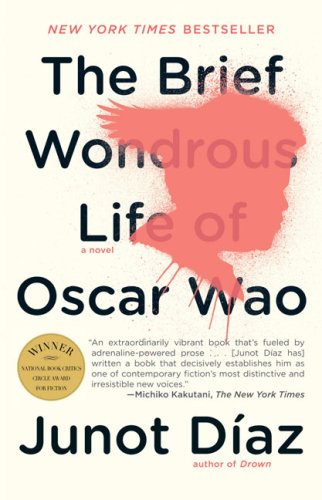All Nonfiction
- Bullying
- Books
- Academic
- Author Interviews
- Celebrity interviews
- College Articles
- College Essays
- Educator of the Year
- Heroes
- Interviews
- Memoir
- Personal Experience
- Sports
- Travel & Culture
All Opinions
- Bullying
- Current Events / Politics
- Discrimination
- Drugs / Alcohol / Smoking
- Entertainment / Celebrities
- Environment
- Love / Relationships
- Movies / Music / TV
- Pop Culture / Trends
- School / College
- Social Issues / Civics
- Spirituality / Religion
- Sports / Hobbies
All Hot Topics
- Bullying
- Community Service
- Environment
- Health
- Letters to the Editor
- Pride & Prejudice
- What Matters
- Back
Summer Guide
- Program Links
- Program Reviews
- Back
College Guide
- College Links
- College Reviews
- College Essays
- College Articles
- Back
The Brief Wondrous Life of Oscar Wao by Junot Diaz
Ever wonder if there is anyone else extraordinarily similar to your personality or habits? If someone reads the exact same books as you? Thinks the same thoughts as you? Some might call him or her a soul mate, best friend, or even a sibling, but there is one character that defies this idea of similarity between two beings.
Oscar Wao, an overweight “Look-Mom-that-guy’s-taking-his-planet-out-for-a-run” Dominican American declared “ghetto nerd,” makes his way through life as your average geek: myths, comics, novels, science fiction, and role-playing inhabit his life like parasites to a host. He says words like copacetic and precipitous while talking to illiterates and thinks nothing of it. (Don’t forget about those wild and unbelievable fantasies that only guys like him are assumed to have.) And although Wao is splashed with a ton of spotlight in this Pulitzer Prize Winner novel, Diaz incorporates his own unique, quirky style of writing to convey thoughts in unexpected manners. He introduces the idea behind Trujillo (short for Rafael Leonidas Truillo Molina), a dictator who ruled with “an implacable ruthless brutality.” This Trujillo staunchly believed in the word fuku, a curse or doom - a Cassandra of the DR, if you will – and had no trouble slapping this dread on some of his Dominican subjects. Instead of beginning the novel didactically, Diaz creeps onto the first page with, “They say it came first from Africa, carried in the screams of the enslaved,” which generally attracts the reader to figure out exactly what this “it” is. Each individual character has his or her own encounter with the fuku and this infamous Trujillo which effects their interpersonal and intrapersonal feelings and actions.
Narrated by Yunior, Wao’s sister, Lola’s, on-and-off boyfriend (did you get that?) as well as Oscar’s eventual roommate as well as a just-above-acquaintance, the stories along with significant others’ stories intertwine to form a melting pot of narration that changes ever so subtly, just to keep you on your toes. Not only does narration intertwine, but also the Spanish language with English. But don’t fret, considering I am coming from only a mediocre Italian education (I caught on quickly to words such as puta and guapa). However, a twist arises throughout the book, and knowing Spanish will not always help Oscar when it comes to dealing with Trujillo’s men. Diaz also does not use quotes around dialogue, just spacing and entering, which tremendously changes the mood of every page, whether morosely heart-wrenching or endearingly comical. In each chapter, there are subchapter title names that engross the reader, for example, “The Condensed Notebook of a Return to a Nativeland,” “What Never Changes,” “Dead or Alive,” and “Last Chance.” A normal Diaz sentence is along the lines of, “The next day the protective bubble about their idyll finally burst and the troubles of the real world came rushing in,” which is also an extremely relatable quote due to its reference of the occasional miseries of realism.
Hypathia Belicia Cabral (Beli), Oscar’s gradually immuno-decreasing mother, demands a larger part of the book with stories from her childhood. Once she hits puberty, she is out and “on the prowl” in the Dominican Republic, working at a miserable minute restaurant with the Brothers Then, who will represent the idea of, “you don’t know what you’ve got until it’s gone.” But don’t have too much sympathy for her yet – Diaz still notes, “In her mind she became his wife that week in every sense but the legal,” showing her promiscuous and desirous side on what I would say is the biggest rollercoaster of life compared to any other character’s.
An abundance of epigrams are scattered throughout the novel that sum up the general idea of each story. One of the most significant is, "Success, after all, loves a witness, but failure can't exist without one." This quote can be verified in so many ways: a parent severely punishing a child’s poor grade while merely congratulating him or her on an excellent one, or even running a marathon: nobody stays for that last place contestant except for his or her family. And although failure must be witnessed and evident, there also must be resolve and compromise, because in this life we will most certainly not get everything we want. Sure, Oscar can be a nerd for all I care. But it’s his own perception that counts, and if that means more alone time, then so be it. As Beli states, “I might have no one in the world, but at least I’m free.”
Similar Articles
JOIN THE DISCUSSION
This article has 1 comment.

